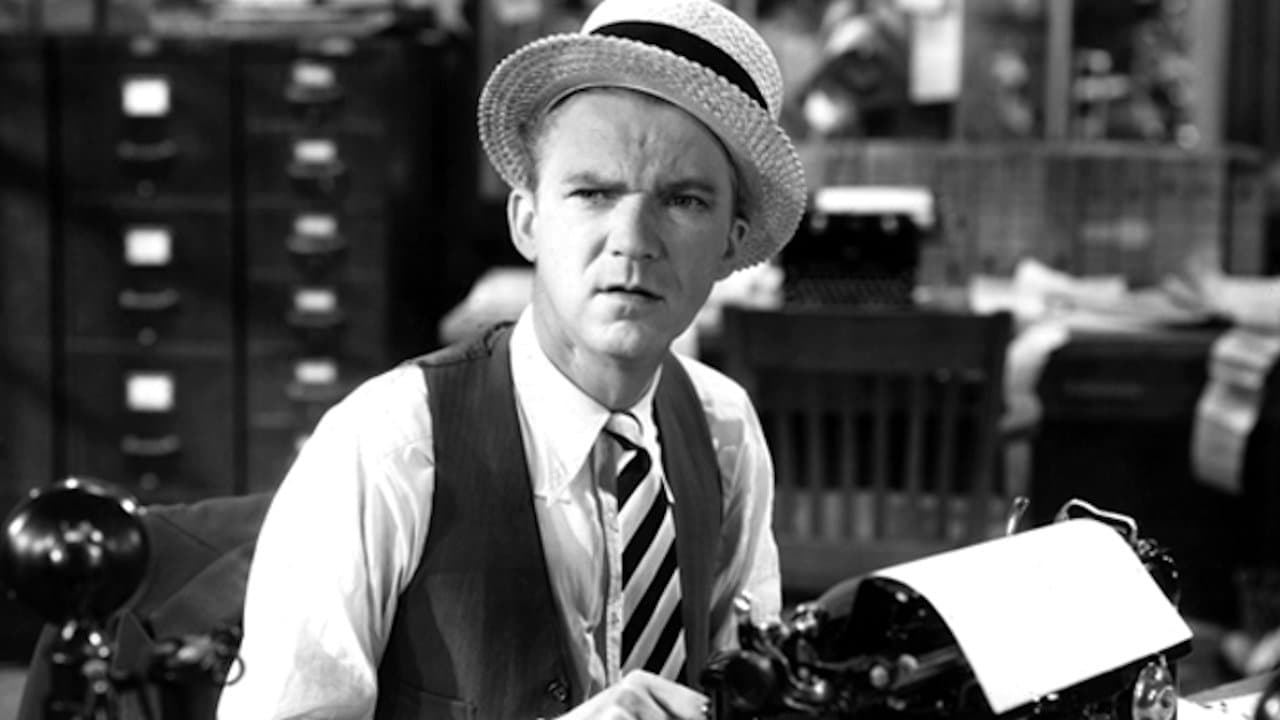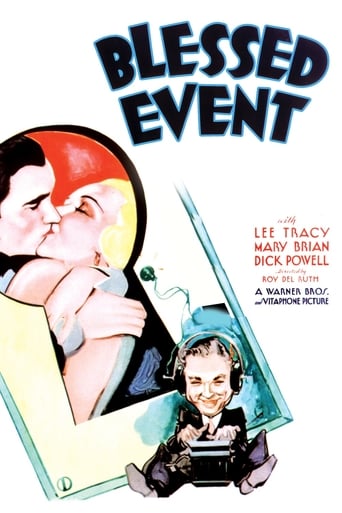

This is Lee Tracy in a definitive role for him in a definitive Warner's precode. Tracy had been a hit in quite a few films over at Warner's but if I was going to recommend just one film that he did that best displayed his fast talking talent, it would probably be this one.Tracy plays Alvin Roberts, a guy who worked in the ad department at a newspaper until someone with a regular column goes on vacation (Ned Sparks as George Moxley). Roberts is given a chance to do the column for a couple of weeks and turns it into a mud slinging piece. He is constantly writing bits about how Mr and Mrs. X are anticipating a "blessed event", even if the event is in October and the wedding was in July. Believe it or not, just the discussion of pregnancy in the 1930's was taboo, even though, as Alvin says, the Blessed Events eventually turn into babies, and who doesn't like babies? Circulation soars, and when Moxley returns he finds that he is now the "pet editor" and Alvin keeps the column.Ruth Donnely plays Alvin's fast talking secretary who answers phones ringing off the hook threatening lawsuits. As she says, "the line forms on the left". Alvin gets in trouble with a local gangster he is always writing about, and when one of his muscle men (Allen Jenkins as Frankie Wells) comes up to threaten him, Alvin turns the tables and scares him by getting Frankie to threaten him with the Dictaphone turned on, then Alvin describes the electric chair to Wells in hilarious detail - who else but Lee Tracy could make the electric chair funny? - and even charms Wells when he shows up at Alvin's apartment and meets his mom. At any rate, Wells ends up becoming a source of information for Alvin.Soon Alvin has radio spots and with his column and appearances is pulling down 90K a year in 1932!. Still in spite of this hardened front Alvin lives at home with mom and drinks milk. Now all through this Alvin has a running feud going in his column with crooner Bunny Harmon (Dick Powell). This is Powell's first credited role, and apparently Harmon got Alvin fired from another paper years ago, so now Alvin goes around talking about what a bad singer Harmon is and showing up in "Alvin free zones" that Harmon has set up. But here's the thing - Dick Powell has no dialogue until the very end, and then it is very generic. Perhaps WB was just trying out Powell as a songbird to see if he went over with audiences.So we have several stories here that begin to collide - Alvin's love for a female reporter (Mary Brian) who does not like how he is making his living, the gangster who can't figure out how Alvin knows his every move, Alvin's feud with Bunny Harmon, and one piece of dirt that Alvin dished out that he wishes that he could take back because it ruined a girl's life. How will all of this work out? Watch and find out. Highly recommended.
... View More"Blessed Event" is a parody of its time and of the media and entertainment of its day including newspapers and radio. But one wonders how exaggerated it really is. The sensationalism of the press and rise of yellow journalism was a frequent part of movie plots in the 1930s. But this one treats of another aspect as well – gossip. Lee Tracy plays Alvin Roberts, who quickly becomes a famous New York gossip columnist. The movie is billed as a drama and comedy. While there is comedy in Robets' character and some of the funny things he says, the drama of the film isn't lost on the audience. We soon feel the distastefulness of Roberts' gossip column. We soon see the inconsiderate character that he becomes. We soon see his ego and pride and relish for the power he has assumed. These are sad situations, and the film shows the tragic results of such power and behavior. Of course, amidst all of this we have occasional funny lines or clever comments. This film could be a biopic of a real person. Other reviewers have pointed this out. Roberts is as an obvious copy of Walter Winchell who was then on the rise as the king of gossip. Winchell was the original gossip columnist of Broadway and New York. He rose to such power through the press that politicians, the rich and famous, sports celebrities, gangsters, and actors feared him or tried to get close to him. Hedda Hopper and Louella Parsons would become the Walter Winchells of Hollywood. Lee Tracy's high-pitched voice and rapid-fire delivery closely emulate Winchell's persona. Although carried to the extreme for this film, those also were natural characteristics of Tracy. For a time, he was a leading actor in great demand. Some of his real lifestyle was similar to Winchell's. He was arrogant and seemed to bathe in the power of his position. Tracy also lived a racy, reckless, self-centered life. His temper, rowdiness and bad manners earned him a "bad-boy" reputation. He was given the boot from MGM after a public incidence in Mexico during filming of a movie there. Tracy urinated in public off a balcony and got in fisticuffs with the police. His later roles about hard-bitten, muck-racking, sensationalist reporters soon wore thin with the public. Tracy returned to the stage and later ended up on television in supporting roles. He had a successful marriage and apparently tamed down before his 1968 death from cancer at age 70.Winchell's fortunes were quite different. From the mid-1930s on, his star continued to rise through the 1950s. He had his own radio show and his newspaper column was syndicated in more than 2,000 papers worldwide. Winchell was very controversial. He had powerful friends and enemies. He was the first media personality to attack Adolf Hitler and the rise of Nazism. He also hated Communism and attacked the National Maritime Union during World War II as being a communist front. He admired Franklin D. Roosevelt and was invited to the White House. He also liked J. Edgar Hoover. Winchell was one of the earliest and most outspoken supporters of civil rights for African Americans. He attacked the Ku Klux Klan and other racist groups. He also supported Sen. Joseph McCarthy's efforts to ferret out communists in Hollywood. Winchell held court at the Stork Club in New York for years. But by the late 1950s, his appeal began to wane. And, his power dropped quickly. His family life was unstable and unconventional and experienced sad deaths. He lived alone his last two years in the Ambassador Hotel in Los Angeles. He died of cancer at age 74 in 1968.In this movie, Tracy's Roberts says repeatedly, "Pride ain't power." He has a few funny lines. "I almost started to death for two weeks," was one. The story is all about so-called "entertainment journalism." The supporting cast are fine, with Mary Brian doing an excellent job as Gladys Price, Roberts' secretary and right-hand man. This movie is interesting in its snapshot of the time and its parodies. It has some historical value for that reason. The cast and production values are all good. And, it's somewhat entertaining.
... View MoreHaving a baby? With or without the benefit of marriage? Is the proud papa somebody not listed on the marriage certificate? If reporter Lee Tracy had actually interviewed perspective mothers, those are the type of questions that he'd ask in this brittle pre-code comedy about the lack of journalistic integrity that has fast-talker Tracy spoofing the position of scandal reporter.It is obvious that many people want to help contribute to the column, but nobody wants to be mentioned in it. Gossip columns and scandal sheets have been involved in the field of journalism ever since the first newspaper was created because as everybody knows, the public demands dirt, and they don't even care if it's true.This is a surprisingly excellent study of one man's immorality in his attempts to rise to the top, and he doesn't seem to care who gets hurt. Of course, he gets too big for his britches, and when he reveals the truth about a single radio singer's impending motherhood in the newspaper (after promising not to), he creates more enemies amongst the criminal element who are involved in the paternal side of the story.Tracy was one of the oddest leading men in the early 30's, but he was excellent for pre-code, remaining a star into the 1940's with fast- talking con-men and scoundrels in a series of low budget programmers. Ruth Donnelly is a riot as the newspaper's secretary, with Ned Sparks delightfully cranky as a fellow reporter. In his film debut, Dick Powell adds a realistic backdrop as a nightclub singer whose songs surround the scandalous atmosphere with period authenticity. To utilize recent events that attracted public attention, Tracy even mentions the Ruth Snyder electrocution, going into details of the last hours of the victim. Sparks makes an observation about a new medium called television which he is convinced will never take off. Among some of the witty dialog in this brisk screenplay is a conversation between Tracy and Donnelly, commenting on a poor Jewish woman who just called to report her pregnancy. He asks her, "Do you know how many Jews there are in New York?" Without batting an eyelash (but raising her eyebrows in mock disgust), she replies, "Oh, there must be dozens." Sparks, in a nightclub scene, notices a drunk and sarcastically snorts, "He must be doing it for the wife and kidneys." Emma Dunn, as Tracy's doting mother without an ounce of gossip in her, tells perennial dumbbell Allen Jenkins that her husband passed away ten years ago. "Bumped off?", Jenkins asks, and with absolute innocence, Dunn replies, "Yes. Off a ladder."
... View MoreObscure and almost forgotten, this is a gem of the type of picture Warner Brothers did best in the 30s. Earthy, moving at a breakneck pace, packed with dialogue that snaps, crackles and pops, it is super entertainment. The Warners look and feel are everywhere, along with several key members of the studio's stock company. The humor (and there is lots of it) has a sardonic edge, much in keeping with the overall tone of the story. Lee Tracy's vivid description of life and death in the electric chair is a grisly, repulsive comedy turn. In an excellent cast, special attention to poor uncredited Isabel Jewell - perhaps just a bit more strident than the role required, but delivering an on-edge performance you will not soon forget.
... View More